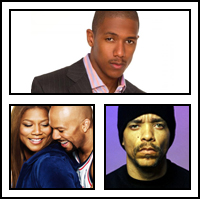-
Black Music Month 2013 - Part 2
June 11, 2013
Have an opinion? Add your comment below. Jerry "Doc" Boulding weighs in on the state of Urban radio.
-
As we continue our celebration of Black Music Month 2013, we recognize that America in 2013 is not the same America that it was in the '80's, '90s or '00s. In those years and decades, we experimented, we learned and grew.
This growth process continues. More than ever, we find that our future is now. During these next few weeks, we will examine that future, the reasons and the changes in music, formats, research, attitude and opportunity. And we will take an in-depth look at the progress that has been made.

Once thought to be primarily an African-American genre, black music has emerged as a powerful brand that reaches across traditional ethnic and economic backgrounds. It's both urban and suburban. It cuts across a rich cultural spectrum, encompassing African-Americans, Whites, Hispanics and Asians. Black music even crosses international borders, finding a global audience that may not even speak English. Our music has become a global language in an increasingly multicultural world. Black music is less defined by race but by a shared lifestyle that transcends, race, age and gender. Urban music is so mainstream now that it has now become mass appeal.
Black music, including hip-hop, has inspired an entire youth group to embrace its language, fashion and lifestyle. Hence today's clothing, sneakers, electronics and entertainment have all been heavily influenced by it. And young listeners, eager to define their place in the world are tuned into it right up into middle age.
These young consumers are drawn to the Urban lifestyle. They have significant buying power. While they may not be able to go out and buy homes like older demographic groups, they can match spending power, pound for pound, on clothing, electronics, entertainment, beverage and snack purchases. It has been estimated that the "urban mindset" market represents over 100 million consumers with a staggering $300 billion in buying power. And that number includes young consumers who grew up with Black music, gained additional economic clout and entered the workforce.
If companies want to reach them they have to remember our listeners touch on not only music choices and concerts, but also clothes, shoes, culture and lifestyle. Identifying with them is a way to reach into the wallets and minds of the young generation. What may have began as an Urban social movement has exploded into an economic juggernaut.
While this economic juggernaut has seen some movement, for the most part, little is happening other than lip service from the government and the corporations involved who seem to believe that somehow the covenants we've asked for will be implemented eventually and that we should continue to be patient. These delays are like a mental illness that comes out of unresolved grief. But America has been known to make promises first to the Native Americans and then to black slaves and now to Hispanics. History bears out how those promises have been kept, modified, legislated and broken.
For example, the level of black ownership of broadcast media has fallen by 30% over the past nine years. It reflects an overall entrenchment in the march toward justice and equality. While African-Americans make up over 30% of the country's population, we own only 3.26% of all broadcast television stations. Unpack these numbers a little further and you'll find the African-Americans own only 1.3% of all stations. This isn't just a problem. It's a national disgrace.

For some African-American leaders whose power depends on appealing to white guilt, this can be very useful as a symbol of continuing injustice. The suffering of the poorest African-Americans creates a fund of political capitol upon which all members of the group can draw when pressing racially-based claims and includes affirmative action preferences that some say go mainly to a growing segment of middle-class blacks.
On the other hand, do we really want to tell a striving middle-class businessman who has barely managed to escape the ghetto that he has a special moral obligation to go back and tutor poor black children solely because his skin color is the same as theirs? The answer is "yes." These walking testaments to the transformative power of possibility in America still have an obligation to reach back and keep reaching back.
New Problems Old Issues
It would be a mistake to assume that today's progress has brought good tidings to all African-Americans. They have not. While it is true that more and more blacks have entered the realm of the privileged and have offices in (or tantalizingly near to) the corridors of corporate and political power, there are new problems, many of which deal with old issues; issues which directly affect many of our listeners in 2013. Issues such as deteriorating housing and problems in education. They may become even costlier in their contribution to dependency, illness, delinquency and waste. As much as they are defined by what they do, they are also defined by what they lack. The so-called "war on poverty," whose goal was to uplift the poor, has been re-designed to contain the poor and simply keep them alive.
Despite these issues, there is reason for hope. These days, television, movies, sports and online video offerings have all attempted to capture the black music magic. In the movie world, films starring rappers and black stars have begun to cause major bounces in box office receipts. Even video games are using black music and stars both on the soundtrack and as major characters in their storylines.
Today's role models have changed from athletes to recording artists. Black music and black artists can be seen and heard all over television, radio and the Internet promoting certain products and services. Black music has proven to be an amazing medium to drive product sales and brand awareness.

Here's an example of one of its success stories. When Western Union starting using black music to promote money transfers, transactions increased by over 90%.
Black music has gained a mainstream appeal that reinforces its ability to sell all sorts of products ranging from automobiles to snacks to movies and smart phones.
Its use is a sure-fire method to connect with young consumers and establish much needed brand loyalty. Such an association can pay dividends for years to come.
As we celebrate another Black Music Month for those of us in radio, it's important to remember that June is a summer month when many of our listeners are out of school, on vacation and have more time to listen. It's also a time when we must recognize our obligation. We have a purpose that extends beyond the ratings and between the hits. America's sound heritage is an important part of our nation's history and culture and Black Music Month allows us to reflect on the diversity and creativity of the American music experience.
I'm happy to be among those who have helped blaze the trail and who believe that the past does not have to be the future.
Word.
(Next week Part 3)
-
-
